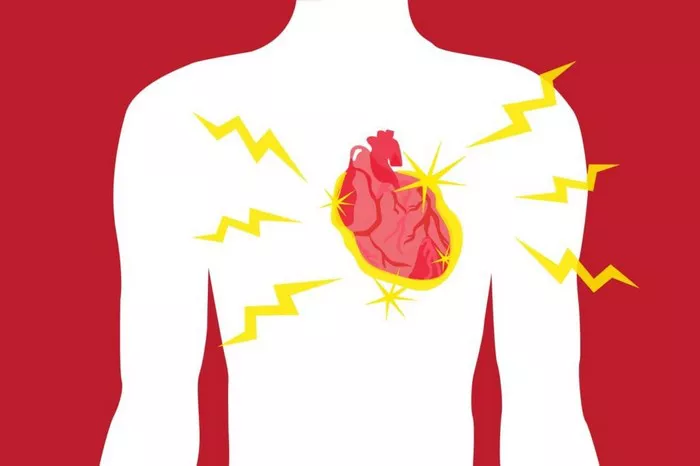Heart inflammation, also known as myocarditis, is a condition characterized by the inflammation of the heart muscle (myocardium).
This condition can affect your heart’s electrical system, reducing the heart’s ability to pump and causing rapid or abnormal heart rhythms (arrhythmias). Understanding the causes of heart inflammation is crucial for prevention, timely diagnosis, and effective treatment. This article explores the various factors that can lead to heart inflammation, delving into infections, immune system disorders, environmental factors, and other underlying conditions.
1. Infectious Causes
Viral Infections
Viral infections are among the most common causes of heart inflammation. Viruses can directly infect the heart muscle or indirectly trigger an immune response that leads to inflammation. Key viruses associated with myocarditis include:
Coxsackievirus B: This group of enteroviruses is a primary culprit in viral myocarditis. It can directly invade heart tissue, causing cell death and inflammation.
Adenovirus: Known for causing respiratory infections, adenovirus can also affect the heart muscle, leading to inflammation.
Parvovirus B19: This virus is commonly associated with erythema infectiosum (fifth disease) in children, but it can also cause myocarditis.
Cytomegalovirus (CMV): Part of the herpes virus family, CMV can infect heart tissues, especially in immunocompromised individuals.
Hepatitis C Virus: Chronic hepatitis C infection has been linked to myocarditis due to its systemic inflammatory effects.
Influenza Virus: Severe cases of influenza can lead to myocarditis as a complication, particularly in those with weakened immune systems.
Bacterial Infections
Bacterial infections can lead to myocarditis either through direct invasion of heart tissues or as a result of the body’s immune response to the infection. Common bacterial causes include:
Streptococcus: Streptococcal infections, especially those associated with rheumatic fever, can cause heart inflammation.
Staphylococcus aureus: This bacteria can lead to conditions like infective endocarditis, which can extend to involve the myocardium.
Borrelia burgdorferi: The bacteria responsible for Lyme disease can cause Lyme carditis, a form of myocarditis.
Mycoplasma pneumoniae: This atypical bacterium, usually causing respiratory infections, can also lead to myocarditis.
Parasitic Infections
Parasitic infections are less common but can cause significant myocarditis, particularly in endemic regions. Notable parasites include:
Trypanosoma cruzi: This parasite causes Chagas disease, prevalent in Latin America, and is a leading cause of myocarditis in those regions.
Toxoplasma gondii: This parasite, which causes toxoplasmosis, can infect heart tissues, particularly in immunocompromised individuals.
Trichinella spiralis: This parasite, causing trichinosis, can lead to myocarditis when the larvae migrate to the heart muscle.
Fungal Infections
Fungal myocarditis is rare but can occur, especially in immunocompromised individuals. Common fungi that cause myocarditis include:
Candida species: These fungi can lead to candidiasis, which might involve the heart.
Aspergillus species: This mold can cause invasive aspergillosis, affecting the heart in severe cases.
Histoplasma capsulatum: This fungus, causing histoplasmosis, can occasionally involve the myocardium.
2. Immune System Disorders
Autoimmune Diseases
Autoimmune diseases can cause the body to mistakenly attack its own heart tissues, leading to myocarditis. Key autoimmune conditions include:
Systemic Lupus Erythematosus (SLE): Lupus can cause inflammation in various organs, including the heart, leading to lupus myocarditis.
Rheumatoid Arthritis: This condition, primarily affecting joints, can also involve the heart, causing rheumatoid myocarditis.
Giant Cell Arteritis: This vasculitis can lead to inflammation of the heart muscle.
Sarcoidosis: This inflammatory disease causes granulomas to form in various organs, including the heart, leading to cardiac sarcoidosis.
Post-Infectious Immune Responses
Sometimes, the immune response to an infection can itself cause heart inflammation. This is seen in conditions like:
Rheumatic Fever: A complication of untreated strep throat or scarlet fever, rheumatic fever can cause myocarditis as part of its broader inflammatory effects.
Kawasaki Disease: This condition primarily affects children and causes inflammation in blood vessels, including those supplying the heart.
3. Environmental Factors
Toxins and Drugs
Exposure to certain toxins and drugs can directly damage the heart muscle, leading to inflammation. Key culprits include:
Alcohol: Excessive alcohol consumption can lead to alcoholic cardiomyopathy, involving myocarditis.
Cocaine: Use of cocaine can cause myocarditis by directly damaging the heart muscle and causing severe vasoconstriction.
Chemotherapy Drugs: Medications such as anthracyclines (e.g., doxorubicin) used in cancer treatment can be cardiotoxic.
Environmental Toxins: Exposure to heavy metals (e.g., lead, mercury) and other environmental toxins can lead to myocarditis.
Radiation
Radiation therapy, especially when administered to the chest area for cancers like lymphoma and breast cancer, can cause heart inflammation as a side effect.
4. Other Underlying Conditions
Systemic Inflammatory Conditions
Systemic conditions that cause widespread inflammation can also affect the heart. These include:
Vasculitis: Inflammation of blood vessels, as seen in conditions like polyarteritis nodosa and Takayasu arteritis, can extend to involve the heart.
Inflammatory Bowel Disease (IBD): Conditions like Crohn’s disease and ulcerative colitis can be associated with myocarditis due to systemic inflammation.
Metabolic Disorders
Certain metabolic disorders can predispose individuals to myocarditis. These include:
Hyperthyroidism: Overactive thyroid can lead to myocarditis due to increased metabolic demand and systemic inflammation.
Diabetes: Chronic inflammation and vascular complications in diabetes can contribute to the development of myocarditis.
Genetic Factors
Genetic predispositions can play a role in the development of myocarditis. Mutations in genes involved in immune regulation or heart muscle structure can increase susceptibility to myocarditis.
Conclusion
Understanding the various causes of heart inflammation is crucial for the prevention, diagnosis, and management of this potentially serious condition. Infectious agents, immune system disorders, environmental factors, and other underlying conditions all play significant roles in the development of myocarditis. Awareness of these causes can help in identifying individuals at risk and implementing timely interventions to prevent complications and improve outcomes. Regular medical check-ups and prompt attention to symptoms like chest pain, fatigue, and arrhythmias can lead to early detection and treatment of myocarditis, ultimately safeguarding heart health.

